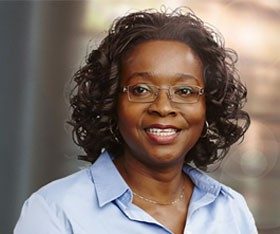Beatrice Ngatcha, Ph.D./J.D.

Beatrice Ngatcha
Lawyer, Patent Agent, Goudreau Gage Dubuc
B.S., Physics and Chemistry, University of Yaounde, Cameroon
M.S., Bio-organic Chemistry, and Ph.D., Organic/Medicinal Chemistry, Laval University, Quebec, Canada
J.D., University of Ottawa, Ontario, Canada
When Beatrice Ngatcha first called a patent agent firm, she was just hoping for a little background information. She had finished her Ph.D. in organic and medicinal chemistry, and was just nine months into a postdoc. She knew she was looking for an option outside of the laboratory, but she wasn’t sure what.
“I only had a vague idea on what a patent agent did,” she says. So she called the firm to get more information. The information session turned into an interview and they offered her a job.
“I was not ready yet to leave research. I was just looking! So I had to make a very important decision. I was just nine months into my post doc, and I had planned initially to stay there at least two years.”
In the end, Ngatcha took the leap and left her post-doc to become a patent agent trainee. After six years, she wanted to be even more involved so she went to law school while continuing to work to become a patent lawyer.
Now she’s a patent agent and lawyer in Canada and an active member of the ACS Chemistry and the Law (CHAL) Division.
Network, interact with peers, do so even if you think you are very busy with work! Try and create time for it. Get out there, talk to people. Don’t stay in your own little closed world. I think it’s very important.
Typical day on the job:
I have no routine. Any day is different. I interact a lot with my local clients, Canadian inventors, who typically are researchers at universities. And also with colleagues—patent lawyers and patent agents—all around the world in the US, Europe, Australia, Japan, South America, everywhere.
My practice typically involves providing patentability opinions, drafting and prosecuting patent applications (domestic and foreign), providing validity and freedom-to-operate opinions, regulatory affairs (drug approval, data protection); I also do help our litigation team.
I spend a fair amount of time reading newsletters and journals, science-related and law-related. I need to at least be aware of what is being developed in science. In order to help secure a strong patent protection for an invention, it is critical to understand it very well. I also need to keep up-to-date with the law including court decisions. Occasionally I do write a paper myself and get it published.
I also spend time out of the office at conferences and networking events—I do not miss the opportunity to give a talk. I’m an active member of a few professional organizations including CHAL and the Intellectual Property Institute of Canada (IPIC).
Work environment:
I work in an office. I basically need a computer and a phone.
Work schedule:
In a typical week I work 45-50 hours. Overtime is not required; however, it depends on the client's needs. Deadlines are very important in the patent field. If I need to work late in the evening or during the weekend in order to meet that deadline for the client, I don’t hesitate to do so. The work environment is generally relaxed.
Tools you can’t live without:
I use patent and jurisprudence databases a lot.
What you like most about your job:
I get to work on various types of technology in the chemical field; I get to be aware of the latest developments. I enjoy the interaction with researchers.
Best productivity trick:
Planning and organization. I like to start the day with a plan, and I get organized according to the plan. I start planning when I’m still at home. The day may not unfold according to the plan, and that is fine. I adjust if there is a crisis. I don’t make a written or electronic list; it’s all in my head. Knowing what my goals are for the day helps me focus.
Best career advice you’ve received:
Network, interact with peers, do so even if you think you are very busy with work! Try and create time for it. Get out there, talk to people. Don’t stay in your own little closed world. I think it’s very important.
Indeed, developing clients is an important aspect of the job. When you join a firm you will be serving clients that the firm already has, if you don’t have clients of your own. But at the same time, if you want to develop your career you need to bring in new clients. And networking is very important in the process.
Equally important or even more, is doing a good job, it is often said. If you have the opportunity to serve someone, you try your best to do a good job, and they will talk about you to other people.
Skills or talents that make you a good fit for your job:
Working as a patent lawyer certainly involves a lot of reading and writing. I would say that my love for reading has helped me a lot. I have always enjoyed reading, ever since I was little. I was that type of kid who is always reading something. You learn so many things when you read, and it also does help you develop your writing skills.
My first language is French, being able to work in both English and French come very handy, particularly in the Canadian context.
Essential habit you wish you’d started earlier:
Curiosity, getting interested in what is happening in science in general, not only in my specific field.
Favorite ACS resource:
Chemical & Engineering News

